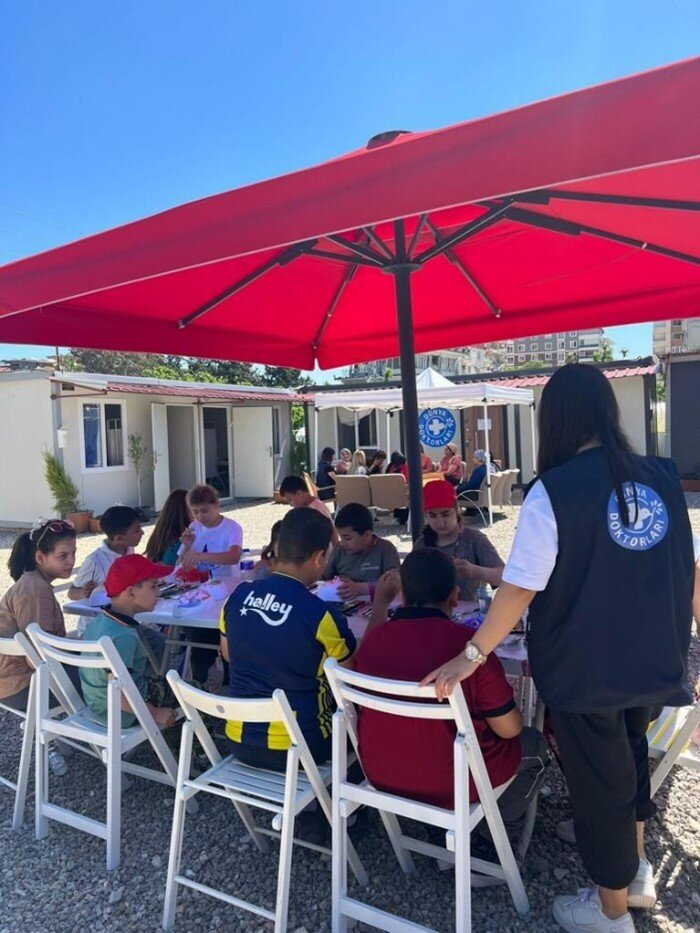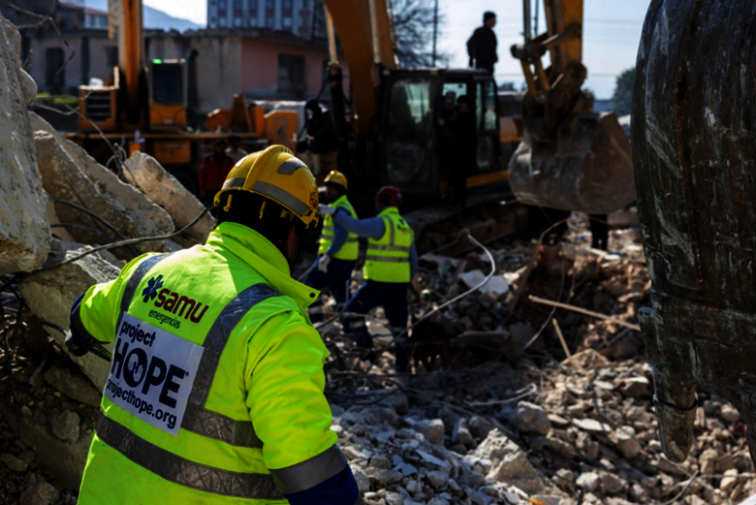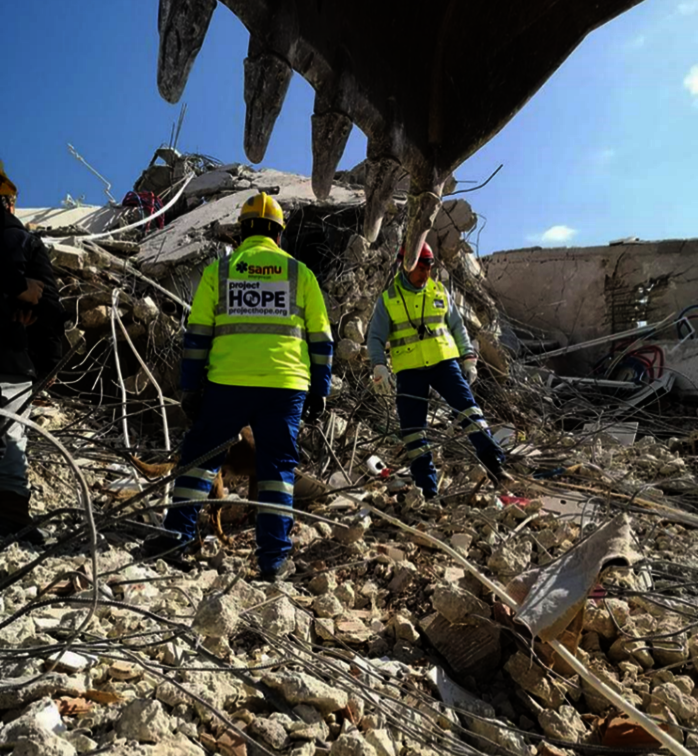By Camdyn Adams | Senior Development Coordinator
Situation Overview
On February 6, 2023 two earthquakes with magnitudes of 7.7 and 7.6 struck Türkiye and Syria,causing extensive damageand impacting 26 million people. The earthquakes in Türkiye had an impact on 11 provinces: Adana, Adyaman, Diyarbakr, Elazg, Gaziantep, Hatay, Kahramanmaras, Kilis, Malatya, Osmaniye, and Sanlurfa, which are home to a total of 14 million people, including 1.8 million migrants. Among those impacted, 7.1 million individuals were living in the areas most severely affected by the earthquakes, consisting of 6.3 million local residents and 800,000 migrants. The number of casualties in Türkiye exceeded 51,000 individuals. Two weeks later on February 20, 2023, southern Türkiye experienced another earthquake with a magnitude of 6.3, resulting in more fatalities and injuries. In Northwest Syria, the death toll exceeded 5,900, with 11,200 individuals sustaining injuries. These earthquakes affected approximately 8.8 million people, with 473,760 individuals being displaced in Northwest Syria.
The earthquakes displaced approximately 3.3 million residents, many of whom were forced to live in shelters and tents while awaiting temporary housing. Immediate requirements for the affected population included access to tents equipped with shelter materials, as well as essentials including clean water, heating, gender-segregated latrines, sanitation facilities, garbage collection, food, undergarments, sanitary napkins, and diapers. Protection and security alsoremains a concern in most settings.
Over four million Syrians have sought safety in Türkiye during the 12-year conflict between the government and opposition military forces. Many of them had relocated to southern Türkiye and faced a backlash of discrimination as some Turkish residents insist that humanitarian aid should first serve the Turkish population before serving the refugee population. In Syria, humanitarian support is being provided in challenging safety conditionsas well as in communities where the two-fold crises have resulted in a nearly collapsed healthcare infrastructure.
Six months after the earthquake, hundreds of thousands of workers in Türkiye and Syria remain jobless, creating significant financial constraints and putting communities and individuals at an increased risk of harm, gender-based violence, sexual exploitation, and adverse health outcomes. In Syria, the loss of 170,000 jobs has affected an estimated 725,000 men, women, and children. In Türkiye, estimates suggest that workers will lose a combined $150 million USD monthly until the economy recovers.
Project HOPE Response
Within hours of the first earthquake, Project HOPE’s Emergency Response team was activated to provide key non-food items to impacted populations. Project HOPE, with a local office in Gaziantep, Türkiye, committed to a multi-actor response supporting those affected by the earthquakes, focusing efforts on delivering vital services to impacted areas such as water, sanitation, healthcare, mental health support, and protection. Project HOPE played a crucial role in the emergency response phase by coordinating with the local government and other local actors to identify gaps and priorities in order to provide a substantial quantity of essential materials and equipment. Essential needs included incubators, containers, medicines, various hygiene kits, blankets, assistive devices, generators, and solar water chlorination systems. These provisions were pivotal in consolidating the healthcare system and supporting the dedicated healthcare workers on the ground.
As part of Project HOPE's commitment to locally led development, we established partnerships with several local humanitarian organizations in Türkiye and Northwest Syria to provide critical services during both the emergency phase and the recovery phase of the disaster. These services include primary healthcare, mental health and psychosocial support (MHPSS), and protection services for the affected population.
Program Activities
In the aftermath of the earthquake, Project HOPE partnered with Dünya Doktorlar Dernegi (Doctors of the World/Médecins du Monde Turkey – DDD/MdM) to support individuals impacted by the earthquakes (including DDD health workers themselves) in Hatay. DDD is a Türkiye-based humanitarian non-governmental organization that facilitates access to healthcare for populations affected by armed conflict, violence, natural disasters, disease, famine, poverty and exclusion. Prior to the devastating earthquakes, DDD supportedthe needs of refugees and migrants through MHPSS services and primary health care (PHC) support via mobile medical units (MMUs). In the immediate aftermath of the earthquakes, DDD was able to apply this experience and mobilize the necessary human resources to effectively respond with the provision of food, laundry services, health services, mental healthcare, and protection interventions. Hatay province was one of the worst affected regions, with over 24,000 deaths. Most of the province's buildings, including public infrastructure and health centers, were destroyed or severely damaged. The region required a comprehensive range of humanitarian aid including water sanitation and hygiene (WASH) activities, distribution of food,and MHPSS. MHPSS has been crucial to addressing the immediate and long-term mental health needs of individuals and communities and promoting the resilience and well-being of those affected.
In partnership with DDD, Project HOPE was able to accomplish the following activities in Hatay:
Following the earthquake, Project HOPE purchased and donated five containers to DDD to significantly expand their safe space operations in Hatay.This safe space was vital for DDD's earthquake response efforts and facilitated a wide range of essential activities for women and girls. Activities included medical consultations, WASH facilities,and individual and group MHPSS counseling. Sexual and reproductive health (SRH) consultations were available from DDD female doctors, nurses, or midwives and included genealogical health checks, antenatal care (ANC) consultations for pregnant women, postnatal care (PNC) consultations to reduce post-delivery complications, and family planning services.
MHPSS consultations were a key component of the essential primary health care (EPHC) package. Individual counseling techniques included cognitive behavioral therapy, emotional behavior therapy, and relaxation techniques, while group sessions focused on children. Both individual and group counseling aimed to address issues such as anxiety, intrusive thoughts, and other trauma-related symptoms. Women and girls were also able to utilize the WASH facilities which included showers, washers, and dryers. The facilities were also available to DDD staff to use after working at the safe space.
During the project, 2,102 individuals benefited from medical services and 1,633 benefited from MHPSS services provided in the containers purchased.
A mobile kitchen was rented and set up in Hatay, and a chef was hired in June to prepare and deliver meals to emergency responders and healthcare workers who did not qualify for UN food distributions. This initiative ensured that approximately 60 individuals received two daily meals while working in the MMUs and providing direct health services. The meals were carefully planned to be balanced and delivered in an environmentally conscious manner to prevent spoilage in hot field conditions, contributing to the overall support for DDD's operations.
MMU staff provided 12,807 medical screenings,provided medication services to 11,511 individuals (25% Syrians and 64% women), and 738 individual SRH services. MHPSS activities were provided to 5,334 individuals through group sessions and direct psycho-social services (PSS) consultations were provided to 467 individuals.
Links:
Project reports on GlobalGiving are posted directly to globalgiving.org by Project Leaders as they are completed, generally every 3-4 months. To protect the integrity of these documents, GlobalGiving does not alter them; therefore you may find some language or formatting issues.
If you donate to this project or have donated to this project, you can receive an email when this project posts a report. You can also subscribe for reports without donating.
Support this important cause by creating a personalized fundraising page.
Start a Fundraiser


